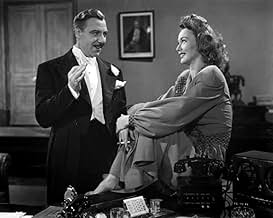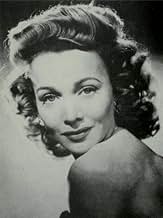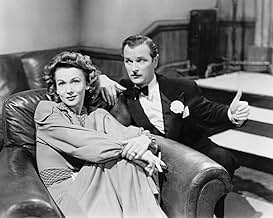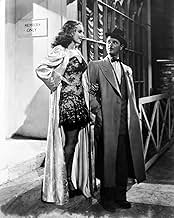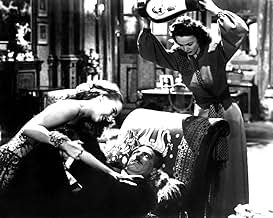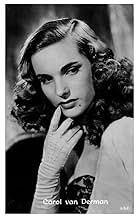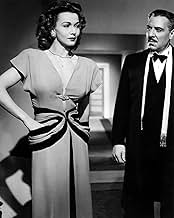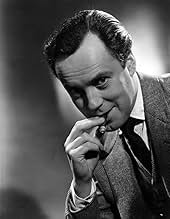In post- WW2 Britain, an American fashion journalist, her ex-army fiancé, and a gang of honest toughs from a local gym attempt to bring black market organized crime to justice.In post- WW2 Britain, an American fashion journalist, her ex-army fiancé, and a gang of honest toughs from a local gym attempt to bring black market organized crime to justice.In post- WW2 Britain, an American fashion journalist, her ex-army fiancé, and a gang of honest toughs from a local gym attempt to bring black market organized crime to justice.
Carol van Derman
- Mercia Lane
- (as Carol Van Derman)
Featured reviews
Being vaguely aware of this obscure British noir, I had acquired it a few years ago from a film buff friend of mine (who also happens to be an award-winning lyricist) following a biography shown on local TV of Maltese film actor Joseph Calleia. It had not occurred to me to include the film in my ongoing Thriller marathon; however, I could not very well leave it out once I read, just a couple of days ago, an article about "Time Out"'s recent "100 Best British Films" in which contributor/French film director Bertrand Tavernier bemoaned there not being enough room in his Top 10 list for, among others, NOOSE! I was under the mistaken impression that the copy I got was of inferior quality which would not best be suited for display on my 40" monitor which is why I watched it on a much smaller screen but, as it turned out, the film did get released on DVD in the UK.
Adapted from his own stage play by Welsh writer Richard Llewellyn (best-known for having penned John Ford's 1941 Oscar-laden HOW GREEN WAS MY VALLEY), the film largely escapes its theatrical roots thanks to Greville's admirably Expressionistic direction that should have earned it a much better reputation (even among fans of the genre and film buffs in general) virtually comparable to that nowadays enjoyed by Alberto Cavalcanti's THEY MADE ME A FUGITIVE (1947) and Jules Dassin's similarly Soho-set NIGHT AND THE CITY (1950; with a wrestling back-drop to NOOSE's prizefighting milieu)! Actually, I do think there is a reason for this neglect since, rather than the relentless post-war bleakness and realism associated with this type of film, there is a welcome air of theatricality (in the acting) and light-heartedness (in the comic incidents that crop up intermittently).
Carole Landis, who for some reason is forever losing her shoes, is a bit too jovial for a noir heroine; ironically, she would die a suicide later in the year, after completing BRASS MONKEY (1948), another genre effort which I hope to acquire (and include) in my current schedule. Derek Farr, too, is a bland leading man – though, as already mentioned, he manages to organize a boxing outfit into efficient opposition to the gangsters involved. On the other hand, Joseph Calleia has one of his better roles: atypically, he received before-the-title billing for this rare foray to the U.K. (incidentally, at the time, our native country was a British colony) and is constantly breaking into Italian and singing operatic arias; though something of a caricature (especially in those scenes featuring his luscious starlet protégée Carol Van Derman), his is an impressive performance regardless. Despite figuring way down in the cast list, Nigel Patrick is really the protagonist as Calleia's right-hand man: he brings such manic energy to the role that it would not be amiss in a screwball comedy!; in fact, on the strength of this, I managed to get hold of Patrick's intriguing self-directed religious parable JOHNNY NOBODY (1961). Stanley Holloway, then, tackles an unusually serious role as the cop on Calleia's trail, while Hay Petrie gives a memorably chilling portrayal as Calleia's combination of private barber and assassin (actually looking a bit like Claude Rains!).
One last thing: I watched this very late at night, believing it to be just 76 minutes long as given on the IMDb: presumably, this duration alludes to the U.S. release print that was re-titled THE SILK NOOSE – being a reference to Petrie's murder 'weapon'; however, the copy I acquired turned out to be the full-length British version running 98 minutes.
Adapted from his own stage play by Welsh writer Richard Llewellyn (best-known for having penned John Ford's 1941 Oscar-laden HOW GREEN WAS MY VALLEY), the film largely escapes its theatrical roots thanks to Greville's admirably Expressionistic direction that should have earned it a much better reputation (even among fans of the genre and film buffs in general) virtually comparable to that nowadays enjoyed by Alberto Cavalcanti's THEY MADE ME A FUGITIVE (1947) and Jules Dassin's similarly Soho-set NIGHT AND THE CITY (1950; with a wrestling back-drop to NOOSE's prizefighting milieu)! Actually, I do think there is a reason for this neglect since, rather than the relentless post-war bleakness and realism associated with this type of film, there is a welcome air of theatricality (in the acting) and light-heartedness (in the comic incidents that crop up intermittently).
Carole Landis, who for some reason is forever losing her shoes, is a bit too jovial for a noir heroine; ironically, she would die a suicide later in the year, after completing BRASS MONKEY (1948), another genre effort which I hope to acquire (and include) in my current schedule. Derek Farr, too, is a bland leading man – though, as already mentioned, he manages to organize a boxing outfit into efficient opposition to the gangsters involved. On the other hand, Joseph Calleia has one of his better roles: atypically, he received before-the-title billing for this rare foray to the U.K. (incidentally, at the time, our native country was a British colony) and is constantly breaking into Italian and singing operatic arias; though something of a caricature (especially in those scenes featuring his luscious starlet protégée Carol Van Derman), his is an impressive performance regardless. Despite figuring way down in the cast list, Nigel Patrick is really the protagonist as Calleia's right-hand man: he brings such manic energy to the role that it would not be amiss in a screwball comedy!; in fact, on the strength of this, I managed to get hold of Patrick's intriguing self-directed religious parable JOHNNY NOBODY (1961). Stanley Holloway, then, tackles an unusually serious role as the cop on Calleia's trail, while Hay Petrie gives a memorably chilling portrayal as Calleia's combination of private barber and assassin (actually looking a bit like Claude Rains!).
One last thing: I watched this very late at night, believing it to be just 76 minutes long as given on the IMDb: presumably, this duration alludes to the U.S. release print that was re-titled THE SILK NOOSE – being a reference to Petrie's murder 'weapon'; however, the copy I acquired turned out to be the full-length British version running 98 minutes.
The Silk Noose, or Noose, as it is also known, from 1948 is a British film starring Carole Landis as a fashion writer for a newspaper.
It's post-war Britain, and despite the war being over, there are many items that are hard to get. An Italian black market racketeer, Sugiani (Calleia) runs an operation in black market goods. So far, the police haven't been able to get them.
A fashion writer, Linda Medbury (Landis), is determined to bring down the gang, although her publisher would rather she stick to clothes. The front for the group, The Blue Moon Club, winds up with a corpse, which sends Linda's reporter tentacles high.
Linda finds herself in danger as does her source. Her fiance is determined to protect her and bring down Sugiani at the same time. It won't be easy.
Sometimes this film seemed like a comedy, particularly with the rapid fire dialogue of Nigel Patrick as a cohort of Sugiani's, and a woman losing her dress toward the end of the film. The last twenty or so minutes has a lot of action.
This was the beautiful Landis' second-last film. What a waste of talent. She gives a vivacious, likeable performance here. Unfortunately, her career fell on hard times when she ended her relationship with Darryl F. Zanuck. Unhappy with her career and misguided in her search for love, she committed suicide. Life in Hollywood for a woman was always extremely difficult, and she was one of its victims.
It's post-war Britain, and despite the war being over, there are many items that are hard to get. An Italian black market racketeer, Sugiani (Calleia) runs an operation in black market goods. So far, the police haven't been able to get them.
A fashion writer, Linda Medbury (Landis), is determined to bring down the gang, although her publisher would rather she stick to clothes. The front for the group, The Blue Moon Club, winds up with a corpse, which sends Linda's reporter tentacles high.
Linda finds herself in danger as does her source. Her fiance is determined to protect her and bring down Sugiani at the same time. It won't be easy.
Sometimes this film seemed like a comedy, particularly with the rapid fire dialogue of Nigel Patrick as a cohort of Sugiani's, and a woman losing her dress toward the end of the film. The last twenty or so minutes has a lot of action.
This was the beautiful Landis' second-last film. What a waste of talent. She gives a vivacious, likeable performance here. Unfortunately, her career fell on hard times when she ended her relationship with Darryl F. Zanuck. Unhappy with her career and misguided in her search for love, she committed suicide. Life in Hollywood for a woman was always extremely difficult, and she was one of its victims.
I rated this film with 6/10 mainly because the final punch-up by the boxers with the mobster gang was inconsistent, being almost comic slapstick with what had gone before involving which involved killings.As is commonly known Carole Landis had been a girlfriend of Rex Harrison and possibly through blighted affection committed suicide the same year as this film aged 29.Nigel Patrick plays an immoral cockney spiv not so ruthless as his partner an Italian gangster played by Joseph Calleia who is prone to lapse into "Don Giovanni" by Mozart occasionally.Stanley Holloway as the detective plays his part without any of the humour found in many other of his film portrayals.Derek Farr gives an unremarkable workman-like performance as the fiancé of Carole Landis.
I was surprised to find this full length 1948 film on Youtube probably because it is in the public domain and therefore out of copyright.
I was surprised to find this full length 1948 film on Youtube probably because it is in the public domain and therefore out of copyright.
Joseph Calleia and Nigel Patrick have built up a massive and occasionally underworld organization. When one of their murders comes to the attention of reporter Carole Landis, she begins a series of newspaper articles. Their increasingly threatening reaction does not faze her, but it leads her boyfriend, Derek Farr, into organizing an armed rebellion. In the meantime, slogging police inspector Stanley Holloway is closing in from his own end.
The script is by Richard Llewellyn, based on his stage play. It's been properly opened up for the screen. The problem is that it's shifting tone, from comedy to drama, never quite works. Joseph Calleia, fine actor that he is, is saddled with a heavy accent and tries to be simultaneously funny and terrifying. Patrick's character spends a lot of time as a fast-talking Cockney, more interested in performing his comedy bits on the telephone, until he decides to suddenly take matters into his own hands and take charge.
The result is a movie that is never quite sure what it wants to be, and tries to distract the audience from that uncertainty.
The script is by Richard Llewellyn, based on his stage play. It's been properly opened up for the screen. The problem is that it's shifting tone, from comedy to drama, never quite works. Joseph Calleia, fine actor that he is, is saddled with a heavy accent and tries to be simultaneously funny and terrifying. Patrick's character spends a lot of time as a fast-talking Cockney, more interested in performing his comedy bits on the telephone, until he decides to suddenly take matters into his own hands and take charge.
The result is a movie that is never quite sure what it wants to be, and tries to distract the audience from that uncertainty.
Tangy post-War British 'Spiv' movie (a cycle of films with roots in 30s American Gangster movies, featuring characters profiting from wartime rationing in a similar fashion to 30s bootleggers, but not so clearly glamorised as their Stateside equivalents). Directed by Edmond T. Greville (BEAT GIRL aka WILD FOR KICKS), and adapted from a stage play, this features Carole Landis (in one of her final roles) as nosy reporter Linda Medbury who, together with her ex-commando boyfriend Jumbo Hoyle (played by Derek Farr), gets on the trail of a gang of post-war black marketeers headed by Soho nightclub owner Sugiani, played by Joseph Calleia (whose role was based on a real-life Post-war London criminal). This gets them mixed up with London 'Spiv' Bar Gorman, played by Nigel Patrick, whose slangy, comic performance almost overshadows the surrounding film. Imaginatively shot, speedily paced, and ripe with post-War vernacular and the requisite criminal dust-ups (primarily involving the good guys' recruited gang of boxers, market porters, and cab drivers versus the low-life criminals), this is an entertaining slice of British crime and deserves to be better known, as it's worthy of a place alongside such noted post-War British crime movies as BRIGHTON ROCK and NIGHT AND THE CITY. Check it out, if you get the chance.
Did you know
- Trivia"Noose" was filmed in England during January and February of 1948. This was the final movie Carole Landis made before her death.
- ConnectionsFeatured in My Journey Through French Cinema (2016)
- SoundtracksWhen Love Has Passed You By
Composed by Edward Dryhurst
Lyrics by Barry Gray and Jean Cavall
Performed by Olive Lucius (uncredited)
Details
- Release date
- Country of origin
- Languages
- Also known as
- Die seidene Schlinge
- Filming locations
- Warner Brothers First National Studios, Teddington Studios, Teddington, Middlesex, England, UK(studio: made at Warner Bros. First National Studios, Teddington, England.)
- Production companies
- See more company credits at IMDbPro
- Runtime
- 1h 12m(72 min)
- Color
- Aspect ratio
- 1.37 : 1
Contribute to this page
Suggest an edit or add missing content

